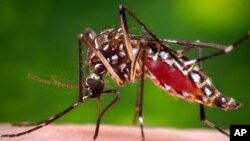The World Health Organization confirms the strain of Zika virus now circulating in the Americas and linked to brain abnormalities in babies is present in Cape Verde.
The World Health Organization reports this strain of the Zika virus, known as the Asian type, has been circulating in Cape Verde since October. It says it was most likely imported from Brazil, the epicenter of the epidemic in the Americas.
Matshidiso Moeti, the WHO regional director for Africa, says this is the first time this particular strain of the virus, which is linked to neurological disorders and microcephaly, a disease that causes brain damage in newborn babies, has been detected in Africa.
“The findings are of concern because it is further proof that this strain is spreading beyond South America and is on the doorstep of Africa," Moeti said. "This just-emerged information will help African countries to re-evaluate their level of risk and adapt and increase their level of preparedness.”
Moeti assumed her current post in February 2015 at the height of the Ebola epidemic in West Africa. She says she will build on the investments made in strengthening health systems in West Africa during the Ebola emergency to improve the region’s readiness in dealing with Zika.
She says surveillance will be increased, vector control measures taken and the public informed of the need to protect itself from Zika by avoiding mosquito bites as well as sexual transmission of the virus.
WHO's executive director, Bruce Aylward, says the agency does not advise a ban on trade and travel to Cape Verde.
“The idea of travel restrictions - that fits in the bucket of seductively simple, but…stupid solutions. They do not work," Aylward said. "And, what you do is hugely complicate the ability to help a country that has already been hit by this thing to actually manage it.”
A different strain of the Zika virus has been in parts of Africa for decades. Aylward says many people may have built up an immunity to the virus. He suggests one area of research is to see whether this immunity could mitigate the impact of the new strain.




